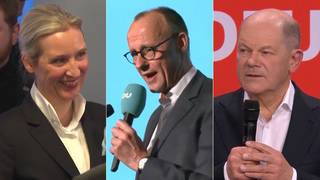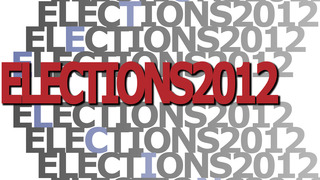
Related
Guests
- Wayne BarrettNewsweek/Daily Beast contributor and a fellow at The Nation Institute. He previously spent 37 years at the Village Voice. His latest report for Newsweek/Daily Beast is “Romney’s Shady Connections From Salt Lake Olympics Still Paying Off.” His new Mother Jones story is “'I Couldn't Love Him More’: How Romney Steered a Key Olympic Project to a Friend.”
Links
- “‘I Couldn’t Love Him More’: How Romney Steered a Key Olympic Project to a Friend.” By Wayne Barrett (Mother Jones, July 2012)
- “Romney’s Shady Connections From Salt Lake Olympics Still Paying Off.” By Wayne Barrett. (Newsweek/The Daily Beast, May 14, 2012
- “Romney Saved Salt Lake Olympics From Scandal, But at What Price?” By Wayne Barrett. (Newsweek/The Daily Beast, April 12, 2012)
- “Did Mitt Romney Help Lake Michigan’s Polluters?” By Wayne Barrett. (Newsweek/The Daily Beast, July 29, 2012)
- Follow Wayne Barrett on Twitter: @Barrettbeast
On the campaign trail, Republican candidate Mitt Romney often touts his stewardship of the 2002 Olympic Winter Games in Utah, which he took over following a massive bribery scandal. In a series of new articles, longtime investigative reporter Wayne Barrett reveals Romney may have violated the new ethics rules he put in place. Today, Romney continues to accept campaign contributions from many key figures tied to the bribery scandal. Barrett, a Newsweek/Daily Beast contributor and a fellow at The Nation Institute, joins us to discuss his findings. [includes rush transcript]
Transcript
AMY GOODMAN: We continue our coverage of the Olympics now with a look at Republican presidential hopeful Mitt Romney’s role heading the 2002 Summer Olympics in Salt Lake City, Utah, a decade ago. The Games, plagued by a massive bribery scandal, Romney was called in to take it over, to clean it up. He often touts his experience while on the campaign trail.
This is an excerpt of a newly released ad by the pro-Romney super PAC, Restore Our Future. It’s set to run in 11 states and features Olympic gold medalist Kristi Yamaguchi.
KRISTI YAMAGUCHI: As an athlete, you’re training your whole life for that one moment at the Olympics.
RESTORE OUR FUTURE AD: But America’s Winter Olympics were mired in scandal and deficits. They turned to Mitt Romney.
FRASER BULLOCK: He faced a $400 million budget deficit and turned that around to a $100 million surplus.
AMY GOODMAN: Well, there’s another side to Romney’s Olympic record. As longtime investigative reporter Wayne Barrett reveals in a new series of articles, Romney was brought in to resolve the 2002 ethics crisis, but he may have violated the new ethics rules he put in place. Today, Mitt Romney continues to accept campaign contributions from many key figures tied to the bribery scandal, including Utah businessman D. Fraser Bullock, who is featured in the pro-Romney ad we just played.
For more, we’re going to Wayne Barrett, the investigative journalist. One of the latest pieces for the Newsweek/Daily Beast is “Romney’s Shady Connections From Salt Lake Olympics Still Paying Off.” His new Mother Jones report is called “'I Couldn't Love Him More’: How Romney Steered a Key Olympic Project to a Friend.”
Wayne Barrett, welcome back to Democracy Now!
WAYNE BARRETT: Great to be here, Amy.
AMY GOODMAN: Great to have you with us. So, tell us, who are Mitt Romney’s friends, and how do they relate to the Olympics, which is one of the few things on his résumé that he is really touting as his—to show why he would be qualified to be president?
WAYNE BARRETT: When your producer called me yesterday, I said, “Well, with all the gaffes, I think he’s going to give up even this part of his résumé.” There are three pillars. He’s given up Massachusetts. Bain has been taken away from him. So the last thing on the résumé is the Salt Lake Olympics. And I thought he embarrassed himself. He got a gold for gaffes in London, and he embarrassed himself so badly, I didn’t think he’d be stressing this. And voilà, a few hours after I talked with your producer, they put up this ad. So, he’s got—he’s got a very weakened résumé.
And let’s give him full credit for what happened in Salt Lake. I think he was a managerial success. I think he overstates what he achieved there, but I think he was a managerial success. The problem is that he was brought in because of the worst Olympic scandal in history, and he befriended and awarded contracts to people deeply involved in the scandal that caused him to be recruited to this rescue operation. And he’s still collecting money from them.
I’ve written about three different characters, one of whom pled guilty in the Olympic scandal; one of whom took the Fifth Amendment in the grand jury and was immunized and testified at a criminal trial that he had made $131,000 in cash payoffs to Mitt Romney’s predecessor, the prior CEO of the Olympic Games; and the third of which was the most recent story, Kem Gardner.
Kem Gardner is Mitt Romney’s closest friend in Salt Lake. He’s a very powerful leader in Salt Lake. They met when they both ran the Mormon stake in Boston years earlier. And Kem Gardner, who was an incorporator of the committee that ran the Salt Lake Games, recruited Mitt for this job. He offered it to him in an initial conversation with Ann Romney, and he got him this job down in Salt Lake. And he is his—Mitt Romney’s son, Josh, until last year, was working for Kem Gardner. He’s extraordinarily close to the family.
And what Mitt Romney did that I think violated the very ethic rules that he introduced in July of 1999, shortly after he took office, which was that you had to disclose any relationship with anybody who was doing business with the committee. He went before the board of trustees on 24 hours’ notice and urged that they select the Gateway shopping mall project of Kem Gardner as the location for the only legacy plaza, only legacy facility that was ever built. And that’s really—whenever Mitt Romney goes back to Salt Lake—he just did it this year in February for the 10th anniversary—the events are held at Gateway Plaza, where his friend Kem Gardner runs this gigantic shopping mall. Kem Gardner got a $4.7 million tax break for putting up this legacy plaza. And it’s really—he did not disclose his relationship. It was approved in violation of the regulations that he introduced. And it’s been an enormous benefit to Gardner’s project to have this destination at his shopping mall.
AMY GOODMAN: I want to play a clip of Mitt Romney in February, when he took a break from the presidential campaign trail to return to Salt Lake City to celebrate the 10th anniversary of the 2002 Winter Games.
MITT ROMNEY: What I learned from the Games is there’s power in unity. We came together as a group of people, not caring about who got credit, but caring about putting on the best Games in the history of sport. And you did, and I will always be proud—proudest—of having been part of the Salt Lake Organizing Committee for the Olympic Winter Games.
AMY GOODMAN: One of the people joining Romney on the stage in February was, yes, Fraser Bullock, who served as the Games’ chief operating officer. Talk more about who he is in relationship to both Romney then and now.
WAYNE BARRETT: Well, he was the indispensable man at Romney’s side. Romney recruited him. They had worked together at Bain. He’s another Bain character. And he comes in and handles all the books and ledgers and finances. And when Romney leaves shortly after the Games to run for governor of Massachusetts, he took over and was CEO, until the books were closed down at the end of 2002. He was at Romney’s side. I quote people, in the story about Fraser Bullock, as saying you would never have a Mitt Romney—this was the governor’s representative on the board—you would never have had a Mitt Romney without a Fraser Bullock. They’re that indispensably tied together.
So, Fraser Bullock and his family and his business associates, at the time that I wrote this—and they may have given more since—gave almost $800,000 to Mitt Romney’s campaign. The people I have written about in these three stories have collectively given over $2 million to the Romney campaign, including Sead Dizdarevic, who’s the ticket broker involved in the London Games. He got his first exclusive contract from Mitt Romney. And he is—he was the one who made the $131,000 in cash payoffs. And Fraser Bullock has become Sead Dizdarevic’s partner in [Jet Set Sports] and CoSport, which are the two companies that are screwing up the Olympics right now. And Bullock is the only minority investor. All the other stock is held by the Dizdarevic family. And Bullock runs this Bain-like private equity firm in Utah. And virtually all of the partners and investors and even the companies that they service have made contributions to Mitt Romney. It’s an orchestrated circle.
AMY GOODMAN: And explain more, for those who aren’t familiar with the corruption scandal of that time.
WAYNE BARRETT: Well, the corruption scandal was—it was the worst in the history of the Olympics. Everyone acknowledged that. $1.1 million in favors were delivered by the Salt Lake Organizing Committee to members of the IOC, the International Olympic Committee, that were selecting the site. These favors were clearly designed to try to influence their votes. One of the people I’ve written about, David Simmons, and his family—and they’ve given another half-million dollars—David Simmons pled guilty to having given a fake job to the son of the vice chair of the IOC at his communications company, his radio company. It was partly an immigration scam, it was partly a tax scam, but it was a totally fraudulent job that was given to the son of an IOC member. Kem Gardner, for example, while he was never directly implicated in the crimes, he was the head of Intermountain—and he was the chairman of the board of Intermountain Healthcare and was designated back in those years, when he wasn’t chairman, as the one that interfaced with the Olympic Committee. And that health service, you know, did surgery on three members of the IOC for nothing, for free. So, these are the kinds of favors that were done over a whole period of time here in the lead-up to the selection of Salt Lake as the site for the 2002 Games.
AMY GOODMAN: Very quickly, what questions should Romney be forced to answer about the 2002 Olympics, and what about Lake Michigan?
WAYNE BARRETT: Well, the key question, which—the mainstream media seems to be just saying, “Well, we’re going along with the Bain critique, but we’re just going to let the Olympic thing sit there as a credit.” And the key question is, why is he taking all this money from people who were implicated in the very scandal that brought him there? Why is he taking all this money? What’s the nature of his relationship with these folks that corrupted the Games?
And I wrote a piece for The Daily Beast that came out on Sunday about the other part of his career that’s ignored, which is he spent 10 years as a business consultant before he created Bain Capital. Seven of those were at Bain & Company, and two and a half at Boston Consulting Group. And I looked at two of his clients that were consulting clients that happened to pollute the lake where he first kissed Ann Romney.
AMY GOODMAN: And you found?
WAYNE BARRETT: I found that, in both of these cases—and one of them is Monsanto, which I think is a company that belongs on the list of the worst corporations in the history of the country. One of them was Monsanto, and PCBs supplied in the hydraulic fluids that were used to drive the die-casting machines at Outboard Marine, which was the largest boat engine manufacturer in the United States at the time, has since gone—been acquired, by the way, by a company controlled by Bain Capital. But Outboard dumped 1.1 to 1.7 million PCBs in the—in Lake Michigan. And I also write about three or four other Monsanto sites on Lake Michigan where they supplied PCBs. And really, Lake Michigan has been polluted largely by Monsanto and partially by Outboard Marine.
AMY GOODMAN: And again, Romney’s connection to this?
WAYNE BARRETT: Well, the connection with Monsanto was clearly spelled out in the piece. There are quotes from several executives, one from Bain, several from Monsanto, saying that they were brought in—Bain was brought in to deal with precisely these kinds of problems and reconfigure the company to get beyond the problems they had with—you mentioned in connection with Dow Capital—I mean Dow Chemical.
AMY GOODMAN: Dow Chemical.
WAYNE BARRETT: Dow Chemical and Monsanto were the manufacturers of Agent Orange during the Vietnam War. They had that kind of problem pushing them back in those days, and they had the problem of the PCBs, which were the biggest chemical disaster, really, in the history of the country. And they were the monopoly manufacturer. Only Monsanto made PCBs in the United States. And so, he was clearly part of the consulting team that got Monsanto through the PCB crisis and reconfigured it now as a company that’s making Roundup and some of these other products.
AMY GOODMAN: We want to leave it there, but we want to continue to hear your reports as you cover Mitt Romney for Newsweek/Daily Beast and also for Mother Jones, a fellow at The Nation Institute. Previously, Wayne Barrett spent 37 years at the Village Voice here in New York. And it’s great to have you back reporting. Thanks, Wayne.
WAYNE BARRETT: So great to be here, Amy.
AMY GOODMAN: This is Democracy Now!, democracynow.org, The War and Peace Report. When we come back, $32 trillion in offshore tax havens? That’s what we’re going to be talking about with the former chief economist of McKinsey. Stay with us.











Media Options